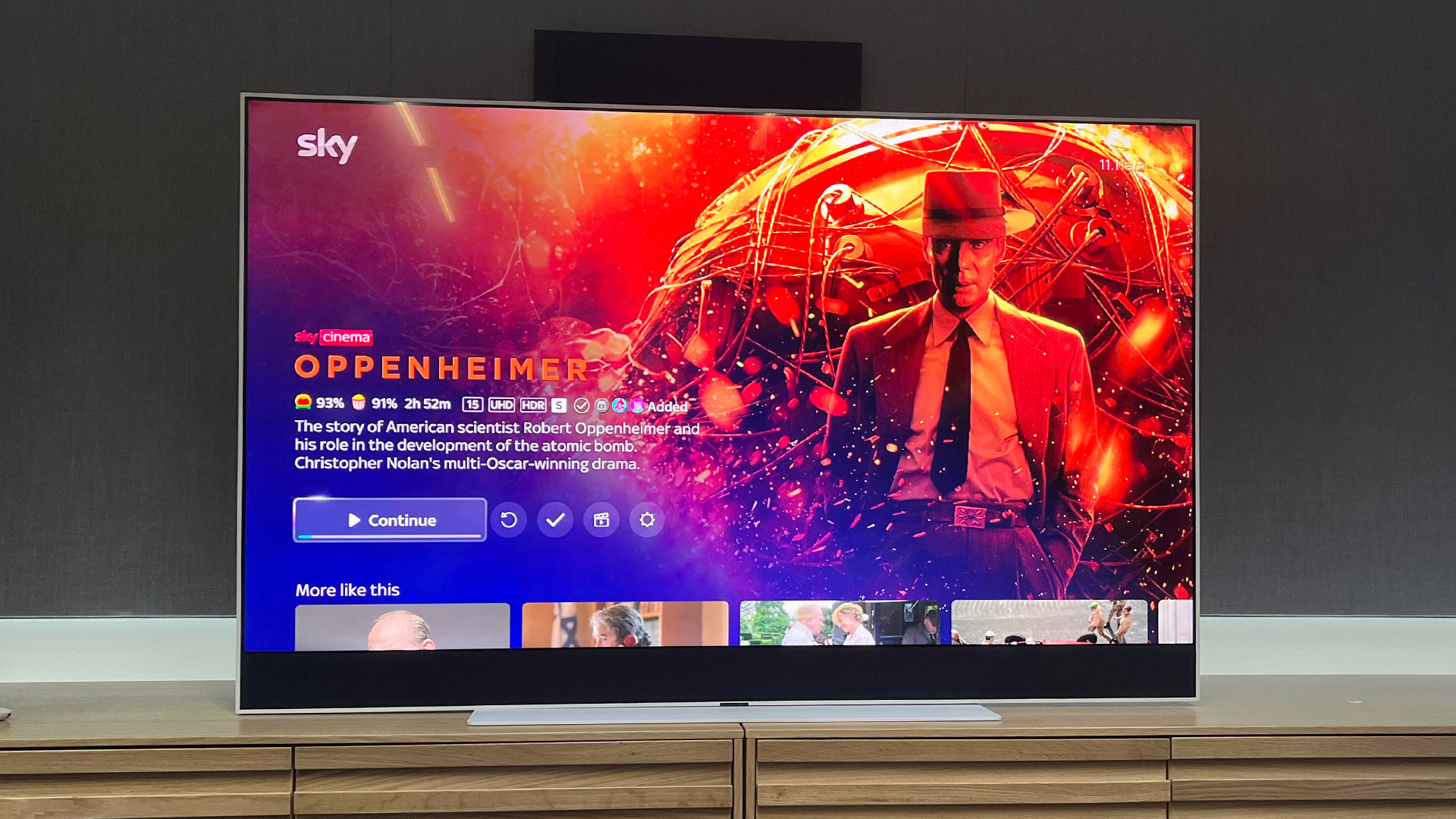How do I find the best broadband provider for me?
There's a lot of choice out there with your broadband, so let's help you decide...

Sign up for breaking news, reviews, opinion, top tech deals, and more.
You are now subscribed
Your newsletter sign-up was successful
When choosing a new broadband package, there's more to think about than just how much it'll cost. After all, if you're purely focused on price, then you may end up selecting a package that's too slow.
So, instead of looking at cost, you should instead focus on getting the best overall broadband deal. This means you also need to consider factors like the speeds you're receiving and the quality of the internet service provider (ISP) that you choose to partner with.
But, with so many ISPs out there and options ranging from large conglomerates to local providers, how do you decide which provider is right for you? Well, we've put together this guide to help you make the right choice.
From speed requirements to cost and everything in between, here's everything you need to consider before you select a broadband provider in 2024:
What are your household's broadband requirements?
No single broadband option is right for everyone. For example, a cheap broadband-only deal will work well for a single person with low usage requirements, but it'll be insufficient for a big family in a large home because it'll likely be too slow. Similarly, a really connected and online family may benefit from a broadband and TV bundle that would be too expensive for a couple that only really watch Netflix.
So, before you start looking at broadband deals and bundles, you need to think about how you'll use your package. To do this, ask yourself the following questions:
- Will you want to use streaming services?
- Will anyone be online gaming?
- How many devices could be used at the same time?
- Do you expect to use a lot of data?
- Will your broadband be for work, leisure or both?
- Do you think you'll be doing lots of video calling?
- Would you be interested in including TV, phone or extra services?
Once you know your basic requirements, you'll find it easier to find packages that suit you. As soon as you have a better idea about what type of package you like, you'll be able to select a provider that either specialises in those deals or has a good reputation for providing those packages.
Sign up for breaking news, reviews, opinion, top tech deals, and more.
For example, if you watch a lot of live sport, you may decide that an upgraded Sky broadband and TV deal is the way forward, as the bundle may be cheaper than buying both services separately.
Alternatively, if you realise you only need a cheap package, then you may decide to instead save some money and look at broadband-only deals from the likes of TalkTalk, Plusnet or Vodafone.

What broadband speeds do you need?
There are many different broadband speeds ranging from slower, but often cheaper ADSL connections, through to ultrafast, but more expensive, Full Fibre and gigabit options capable of delivering speeds in excess of 1,000Mbps. But, as a general rule of thumb, the faster your speeds, the better they will cope with higher download demands.
In other words, if you know you'll be doing a lot of streaming, or online gaming, you'll want a faster speed and unlimited data. Alternatively, if it's just a package for casual browsing, something slower with a data cap will probably fit the bill.
To give you a top-level overview, these are the common broadband types and average download speeds you will encounter on the markets:
- ADSL broadband - also known as ‘standard’ broadband and can give speeds of 10-24Mbps.
- Fibre (FTTC) broadband - also known as ‘superfast’ broadband and can give speeds of 30-70Mbps
- Full Fibre (FTTP) broadband - also known as ‘ultrafast’ broadband and can give speeds of 100Mbps and above
- Gigabit-capable broadband - also known as ‘gigafast’ broadband and gives speeds of 1,000Mbps and above
You may want to also review your current broadband speeds by looking at your current package, or by doing a speed test. Then, if you feel your current speeds are satisfying your needs, or you need more/less, you know what types of deals to look out for when shopping around different providers.
We also have detailed guides to different home broadband speeds and 'what speeds are needed for streaming?' if you also want to get a little more clued up on this.

What broadband type can you access?
The next point to consider is the broadband speeds you can access at your property.
While you may love the idea of signing up for a gigabit-capable package that's one of the fastest on the market, the reality may be that the technology is not yet available at your property.
The easiest way to find out exactly what is available at your property is by running a broadband speed test. You can find out what’s on offer in your location by going directly to different ISPs, or by checking online with Openreach – the main UK broadband network provider.
There are plans to upgrade the UK's fibre network (covering all provider networks) so that more and more homes will be able to access Full Fibre deals. However, the reality remains that less than 70% of properties can currently access these deals.
If you can't yet but you'd like to have the highest download speeds possible, then it may be worthwhile looking into other types of broadband, such as 5G broadband and satellite broadband.
Where is your broadband's access point?
Another consideration to make is where the broadband access point is on your property, as this can affect the performance of your WiFi. Ideally you’ll want your router in the middle of your home or business, off the floor and not near any thick walls. If you have it tucked away in a far corner behind lots of furniture and away from the room you’re likely to use it most, it can affect your WiFi signal strength.
As such you might want to consider getting a new access point installed, or getting a more powerful broadband connection/router or WiFi boosters. Whether or not these are available is something to look out for when shopping around providers.
You can find out more about this in our comprehensive guide around the processes that can be involved with broadband installation.

How much can you afford to pay?
Although we did say there's more to the best broadband providers than just the cost, it is still an important factor. You'll of course want to get the best value, so be on the lookout for what deals, discounts and offers providers have throughout the year, as this is a great way to potentially save in both the long and short term.
We can also help here, as if you head to our best broadband deals guide you'll be able to see what's available from some of the country's top ISPs right now. Plus, you can get a better idea of what savings can be made on everything from upfront fees, to add-ons and more.
Naturally, what you decide here also comes down to what you can actually afford to pay each month, but you shouldn't just opt for the cheapest option out there. It can be the case that you end up paying more in the long run, as cheaper tariffs often have data limits and you may need to pay a hefty fee for exceeding these.
However, if you have your heart set on affordability, check out our cheap broadband deals guide to see what different ISPs are currently offering.
Are you eligible for a social tariff?
With the above point in mind, if you are on a lower income, or you’re in receipt of certain benefits, you might be eligible for a social tariff, but only certain providers offer these.
If you’re not familiar with these particular packages, they work the same way as standard unlimited broadband packages, but they’re cheaper and are usually a provider’s slower speeds. They also don’t have any mid-contract price increases.
You can find out more about these – and the providers who offer them – here with Ofcom. The page also summarises the eligibility criteria as follows:
- If you or someone in your household claims Universal Credit, you could switch to any of the tariffs available.
- All major providers also include people on Pension Credit, Employment and Support Allowance, Jobseeker’s Allowance and Income Support.
- Some providers might include additional benefits, like Personal Independence Payment and Attendance Allowance.
- The person receiving the benefit needs to be the main person on the contract.

What contract length do you want?
To follow on from price, you may also wish to review the different contract lengths that ISPs offer their customers.
The majority of providers now offer 18-month or 24-month contracts and it's increasingly common that ISPs will try to lock in customers for longer. However, contract lengths do vary from provider to provider and it's fair to say that certain ISPs are far more flexible than others.
For example, if you look in our comparison guide between Sky and BT's broadband, you'll see they both exclusively offer 18 and 24-month contracts, so if you went with either of these you'd have to be committed to sticking with them for a while. By contrast, smaller ISPs like NOW have been known to offer shorter contracts, including 12-month deals that are becoming increasingly rare to find.
A top tip here is to also look at whether or not there are any exit fees if you sign up for a longer contract. This is because if you do wish to leave or switch providers before your contract is up you'll know whether or not you'll need to factor in an additional cost from these penalties.

Do you need a phone line?
Nowadays, a lot of broadband deals are broadband-only packages. This means that they come without any form of call package.
That said, rather confusingly, some providers do include a phone service as standard in a 'broadband-only' package, so it's worth checking the details carefully. If they don't, you may be able to select phone services as an extra or 'bolt-on' service.
If you'd like to learn more about whether you'll receive a phone line, a landline or a call package included in your deal, check out our 'do you need a landline for broadband?' guide.

Will you want a TV bundle?
Many leading ISPs now have some form of TV bundle you can have alongside your broadband.
The likes of Sky, Virgin Media, BT (although the TV service is now delivered via EETV) and NOW have the biggest selections, with the first two being arguably the market leaders here. But with others you can also bolt on different channel packages and attach all your streaming apps too.
Choosing a broadband and TV bundle may also help inform the broadband speeds you want, as again, the faster these are the better they can handle multiple devices streaming in HD and UHD. Also, with Sky for instance, those who choose 'Full Fibre' tariffs to support their TV service will also be able to get additional sound boosting features and better quality streaming services around their property.
Our best broadband and TV deals page can show you what's on the market right now.

Are the customer services any good?
Customer services can be just as important as any other part of an ISPs broadband product offering. After all, if you do have a problem or an issue with the service you’re paying for, you should be able to get it resolved.
However, not all broadband customer services are created equal and it’s no secret that some are better than others. So again, this is something to review before you choose an ISP - especially if you aren’t as tech savvy as you’d like.
As part of your research, you should check out the following:
- Provider reviews and awards - especially positive accolades for their customer services.
- Trustpilot scores - the higher the better and with these reviews you can see exactly what customers like/don’t like about them.
- Ofcom reviews - the UK broadband regulator regularly reviews and scores ISPs on the quality of their services. You can see the latest updates here.
- What support ISPs offer - whether it be online, over the phone, via email or a combination of these, it’s worth investigating what support you’ll get with each ISPs’ tariffs.

Are you concerned about online security?
The online world can be a dangerous one at times and there’s always the threat of viruses, trojans and malware. All it takes is one dodgy download or accidental ad click to get your device infected, so having extra protection from this can be useful.
Most ISPs now have some form of online security software available, but it’s not always clear what this actually does or how it works. So simply asking what protection is in place and if there are any additional security options with your new broadband deal can be a smart move.
What other extras might you want?
Sometimes ISPs are quite upfront about the variety (or lack) of extras you can include in your package. So, to help you get the best value on your next deal, here are some of the things you should be on the lookout for when choosing a provider - especially if you're a new customer:
- WiFi boosters
- Services apps
- Accessibility to a provider's UK WiFi hotspots
- Speed boosts
- Partner benefits (such as Virgin Media's 'Volt' benefits for O2 customers)
- Free gifts or bill credit
- Router upgrades
- Free streaming service subscriptions

The USPs of leading UK ISPs
Like we mentioned earlier, we're not short on options when it comes to broadband providers, but some are still known for specific unique selling points - even though the markets are becoming more and more competitive.
Here are a few examples from some previous reviews we've put together that you might use to sway your decision:
- Virgin: has the fastest broadband speeds
- EE: offers gigabit speeds
- Sky: best quad-play provider
- BT: best all-rounder
- Vodafone: most affordable pricing for fibre internet
- Hyperoptic: most affordable for ultrafast speeds
- Plusnet: most frequently the cheapest provider
- TalkTalk: most affordable internet across all categories
- NOW Broadband: best for cheapest for broadband and TV
How to find the top broadband deals
Now you know more about what different providers have to offer – but also that your needs and circumstances are what should inform your decision – you’re probably going to be wondering where you need to look to find the right deals.
This is where we can help, as our guide to the best broadband deals is home to the latest top offers from all the most leading UK providers. In addition to this, if you are unsure about different broadband availability in your area, you can enter your postcode into our widget below and our tool will show you the specific offers that you can get in your location.
Another option you have is to speak to your current provider and see what (if any) upgrades are available to you, or if you can look to change your current deal to something more in line with your requirements.
All broadband offers
Struggling to find a broadband deal which suits your needs? Check out more of our top offers from the UK's best broadband providers below in our deals widget to see if there is a better broadband offer for you:

Rich is a freelance copywriter and content strategist with over 10 years' experience. His career has seen him work in-house and in various agencies, producing online and offline content marketing campaigns and copywriting for clients in the energy industry.